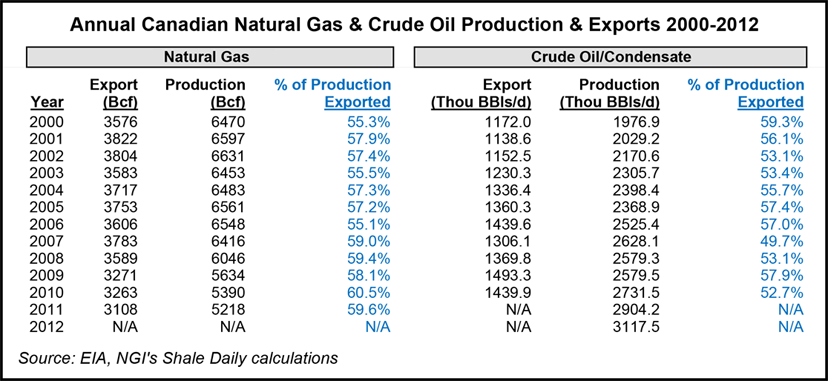NGI Archives | NGI All News Access
Canada Launches Asia Trade Mission Hoping to Lure Oil, NGL Buyers
Canada Minister of International Trade Ed Fast said his country is an “energy superpower” that “must” export more oil and natural gas to Asian markets in announcing plans for a trade mission to China and Japan in hopes of increasing exports.

In a speech in Vancouver on Wednesday, Fast, who also serves as minister for the Asia-Pacific Gateway, told attendees at the Asia Pacific Foundation of Canada’s Pacific Energy Summit that his country was in a unique position. He said global energy demand was expected to increase by 40% from 2010 to 2035, with a large portion of demand coming from Asia.
“What Canada and the Asia-Pacific region have before them is an [exceptional] complementarity of assets and needs,” Fast said, according to notes provided from Ottawa. “On one hand, [there is] Canada’s abundance of energy assets and our need to sell them at their highest value; on the other, the extraordinary magnitude of the demand for energy in China, Japan, India and other Asian countries. In short, you need resources, and we have them.”
Fast said he and Alice Wong, a fellow member of Parliament from British Columbia (BC), would lead a trade mission to China and Japan. He said Wong would begin the trade mission by leading business delegations in Shanghai and Hangzhou in China, and he would join her for meetings in Tokyo and Yokohama in Japan. Visits to Hong Kong and Beijing are to follow.
“We have a once in a lifetime opportunity to work together to capitalize on Canada’s energy and work with our trading partners to create long-term prosperity for our citizens,” Fast said. “Our government is committed to using every tool we have at our disposal to continue to open new markets for our exporters.”
Fast said Canada, the world’s third-largest producer of natural gas, held up to 37 trillion cubic meters of natural gas resources, two-thirds of which would come from unconventional sources, including shale. He added that five projects to export liquefied natural gas (LNG) through BC were currently under way:
“These projects are attracting investors from Japan, Korea and China, and understandably so,” Fast said, adding that projections from the International Energy Agency (IEA) “show that between 2010 and 2035, natural gas consumption in China will grow by five times, [and] India’s by three times.”
Fast reminded the attendees that Canada was the world’s sixth-largest producer of oil, and held the world’s third-largest oil reserves. He said his country’s oilsands held “enormous potential” for meeting energy demands throughout Asia.
“The oilsands are a great Canadian success story and we are keen to export this important energy source to our Pacific neighbors,” Fast said, adding that the proposed Northern Gateway Pipeline (NGP) would transport 525,000 b/d to Kitimat for eventual shipment by tanker to Asia (see Shale Daily, Oct. 6, 2011). “There is, therefore, considerable incentive on both sides of the Pacific to make oil pipeline and BC’s LNG projects work.
“Canada does not currently export LNG to Japan and exports very little crude oil and petroleum products there. We want to change that. We must change that.”
Spectra said it plans to begin construction on its project in 2015 and have it in service in 2019. Meanwhile, Pacific NorthWest LNG anticipates construction beginning in late 2014 and exports to begin in late 2018.
© 2024 Natural Gas Intelligence. All rights reserved.
ISSN © 2577-9877 | ISSN © 2158-8023 |

